by Lacey Cooke | Oct 23, 2018 | 01 What's New, Colonial (US.), Legacy Tree Genealogists, United States
Colonial ancestors pose a unique challenge to the genealogist in that they often appear in many online family trees, but those trees frequently lack sufficient documentation. Eliminating the purely speculative and identifying verified relationships and accurate data is the goal. Here are three of our favorite online resources for finding colonial ancestors.
Thanks to Bob Call and the experts at Legacy Tree Genealogists for this guest post!
1. AmericanAncestors.org
The fantastic subscription-based website, AmericanAncestors.org, is the creation of the New England Historic Genealogical Society. NEHGS was founded in 1845 and is the oldest genealogical society in the United States. As such, they have had nearly two centuries to gather and preserve materials pertinent to family history. According to their “about” page, AmericanAncestors.org presents “more than 1.4 billion records spanning twenty-two countries” and is “one of the most extensive online collections of early American genealogical records.”
Of the 435 databases hosted on AmericanAncestors.org, 286 are focused on pre-1800 records. These databases include vital records, censuses, migration, bible, cemetery, tax, voter, property, probate, court, and military records as well as family histories, local histories, biographies, reference material, and periodicals. Searching these records is easy with the “Search All Databases” page, which allows the user to add a variety of search terms—names, years, record types, locations, keywords, and additional family members. With so many record types available to the genealogist, the databases at AmericanAncestors.org are a must for colonial family history research.
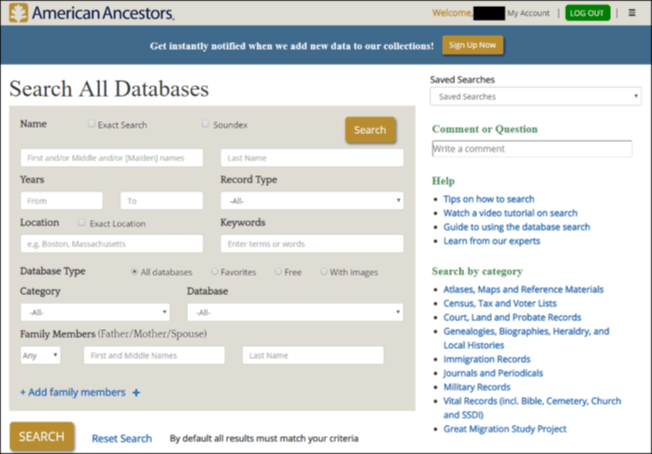
Besides research databases, AmericanAncestors.org offers access to a number of other helpful services. Two of these services are the Digital Collections and the Library Catalog both of which are portals to the extensive collections housed at the NEHGS library in Boston, Massachusetts. When searching the Digital Collections webpage the family historian will find personal family papers such as photographs, diaries, and letters as well as records created by non-family entities like organization and business records and newspapers. The Digital Collections section of the website also has a focus on the history of the Jewish community in the Boston area and offers material helpful to both the historian and genealogist.
The Library Catalog gives the family historian the ability to begin their research of NEHGS’s extensive collections at home. Of course, a catalog is different than a database in that a catalog lists the titles of the library’s holdings and not every name mentioned within each item. However, if planning a trip to NEHGS to conduct research, it would be wise to have a starting point for your research—that way you can hit the ground running and make the most of your time at the library itself. Use the catalog by searching family surnames and ancestral residences to find books, manuscripts, or photographs that may be beneficial to your research.
2. Digitized Books
Our experience reveals that many online trees presenting colonial American ancestries are based upon genealogies published in the nineteenth and twentieth centuries (although the online trees themselves frequently do not cite the published genealogies). Genealogies published in the nineteenth century and early twentieth century are not always accurate and rarely included extensive citations supporting each statement of fact as contemporary genealogies should, but they can still be helpful. These genealogies occasionally referenced original sources (such as wills or deeds) or made blanket statements about what type of records were used (like family correspondence or county records).
Additionally, the printed genealogies provide a clearer picture of what previous generations believed about their genealogy before the advent of the internet, which escalated confused and inaccurate pedigrees because of the ease of data sharing and a general lack of quality control. Thus, published genealogies can provide important clues about colonial American families. Accessing these published genealogies was much more difficult just a few years ago, but thanks to websites like Archive.org and Google Books many can be viewed right at home. These organizations have taken the time to digitize genealogies which are now in the public domain due to copyright laws.
3. The FamilySearch Catalog
One underutilized resource on FamilySearch.org is the FamilySearch Catalog (formerly known as the Family History Library Catalog). This tool inventories all of the holdings at the massive Family History Library in Salt Lake City, Utah. A majority of the holdings at the Family History Library are on microfilm, which FamilySearch plans to digitize by 2020. While some of these digitized microfilms have been organized into databases available through FamilySearch’s “Historical Records” portion of the website, many are only found listed as microfilm in the FamilySearch Catalog. In other words, there may be a collection of digitized microfilms that can only be viewed online by clicking on the link in the FamilySearch Catalog and will not be found in a “Historical Records” database.
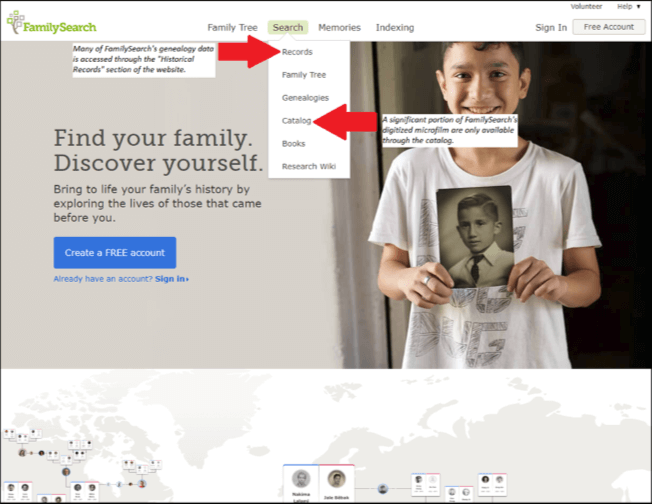
So what does this mean for researching colonial American ancestors? There are two record types in particular where the FamilySearch Catalog becomes exceptionally beneficial to colonial research—property and probate records. These record types are useful because they can prove, through both direct and indirect evidence, family relationships in times or places where other documents (like vital records and census) are lacking. However, because property and probate records are difficult to index there are fewer databases in FamilySearch’s “Historical Records” which focus on them. This is where the FamilySearch Catalog comes in; many microfilms of probate and property records have been digitized and are accessed in the catalog. These high-quality digital images—often of better quality than the microfilm itself—can be clicked through in search of an ancestor’s property or probate records.
Here’s an extra tip: Some of the probate records that have been digitized in the FamilySearch Catalog can only be viewed at the Family History Library or a Family History Center—due to agreements the Family History Library has with the original agencies, the images are locked and cannot be accessed at home. If you can’t make it to your local Family History Center, one workaround is checking Ancestry.com to see if that database has the probate records in question. Ancestry’s probate databases include a searchable index, but these indexes are very incomplete and it is best to browse through the images.
Using these resources and many others, our team at Legacy Tree Genealogists has assisted many with their Colonial American research problems and would be glad to assist in discovering your Colonial ancestors as well.
Bob Call is a researcher for Legacy Tree Genealogists, a worldwide genealogy research firm with extensive expertise in breaking through genealogy brick walls. Whether you’ve got colonial ancestors or ancestors all over the world, you can get expert research help and access to records otherwise unavailable when you partner with Legacy Tree Genealogists. Visit their website to learn more and get a free consultation!
Exclusive Offer for Genealogy Gems readers: Receive $100 off a 20-hour research project using code GGP100!
Disclosure: This article contains affiliate links and Genealogy Gems will be compensated if you make a purchase after clicking on these links (at no additional cost to you). Thank you for supporting Genealogy Gems!
by Lisa Cooke | Sep 9, 2016 | 01 What's New, Records & databases
Colonial genealogy records are just the tip of the iceberg in this week’s new and updated genealogical collections. If your roots go back to the early days of the American colonies, you will want to get started in these unique colonial genealogy records. Additionally, some fantastic finds for the United Kingdom and Denmark are also available in this week’s gems.
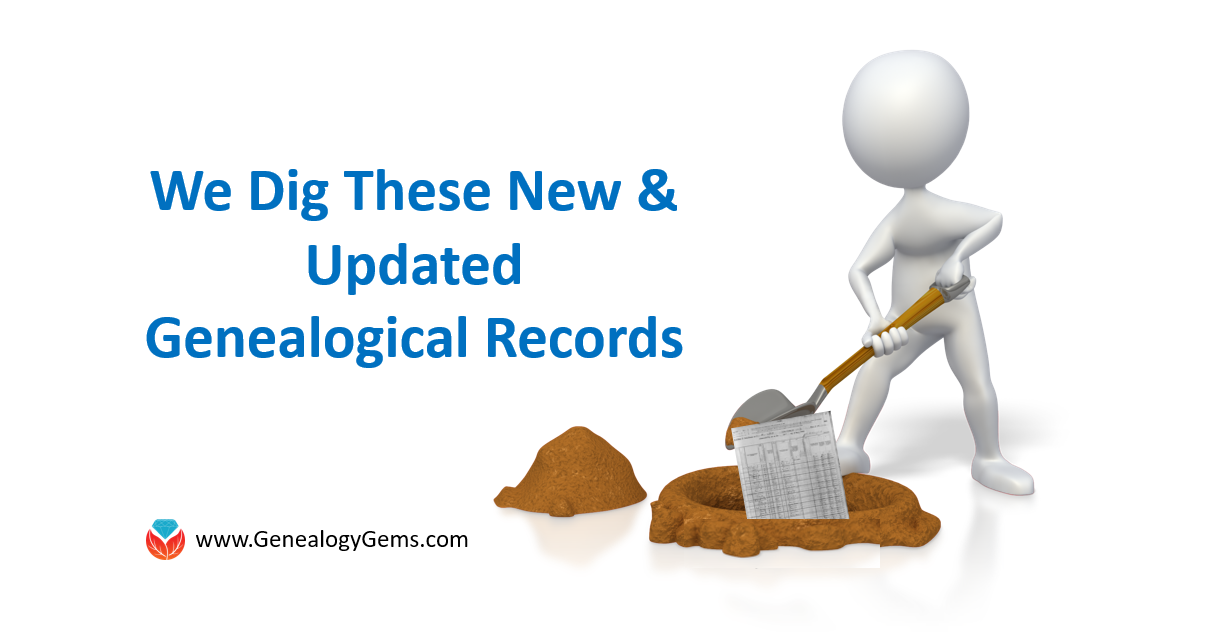
Attention! Special Announcement!
Each week, we bring you the new and updated genealogical collections at Findmypast and many other genealogy websites. This week, we are excited to announce that Findmypast is offering a new and lower annual subscription price! Get this brand new “Starter” local package by clicking here.
Findmypast offers millions of genealogical records including U.S. birth, marriage and death records, U.S. immigration and travel records, U.S. newspapers and a collection of U.K. census records.
United States and Canada – Transatlantic Migration
First things first: where and when did your early American family arrive in the New World? Findmypast has added a new collection titled United States, Transatlantic Migration. This collection offers more than 30,000 records shedding light on the lives of your migrating ancestors from England, Scotland, Ireland, the Netherlands, Germany, and France from as early as the 1500s to as recent as the 1900s. Some information you may be able to find include: birth countries, date of emigration, ages, occupations, and names of family members. Once you have found where your family settled, head on over to the next record set for founding families.
United States – Colonial Genealogy Records
Findmypast’s colonial genealogy records set titled United States, Early American Families is a one-of-a-kind collection. These records will help you learn even more about your ancestral ties to early founding families in America. Dive into 140 publications containing over 86,000 records. These records provide details regarding the early families and their descendants. You might even learn the birth or death year of your family’s brick wall ancestor!
A sister colonial genealogy records collection titled United States, Early American Vital Records will also be of interest to those searching the colonial American family. This collection is filled with over 14,000 vital records as early as the 1600s! You will be delighted with the many birth, marriage, and death registers, gravestone inscriptions, and wills you can find here.
United States – Connecticut – Town Vitals
The Barbour Collection of Connecticut Town records, also from Findmypast, contains over 18,000 vital record volumes pertaining to Connecticut towns. You will need to search these records by surname. If your ancestral surname is located, you will find a PDF image that may list the birth or death dates, names of family members, and other personal details of the Connecticut family.
United States – Colonial Williamsburg
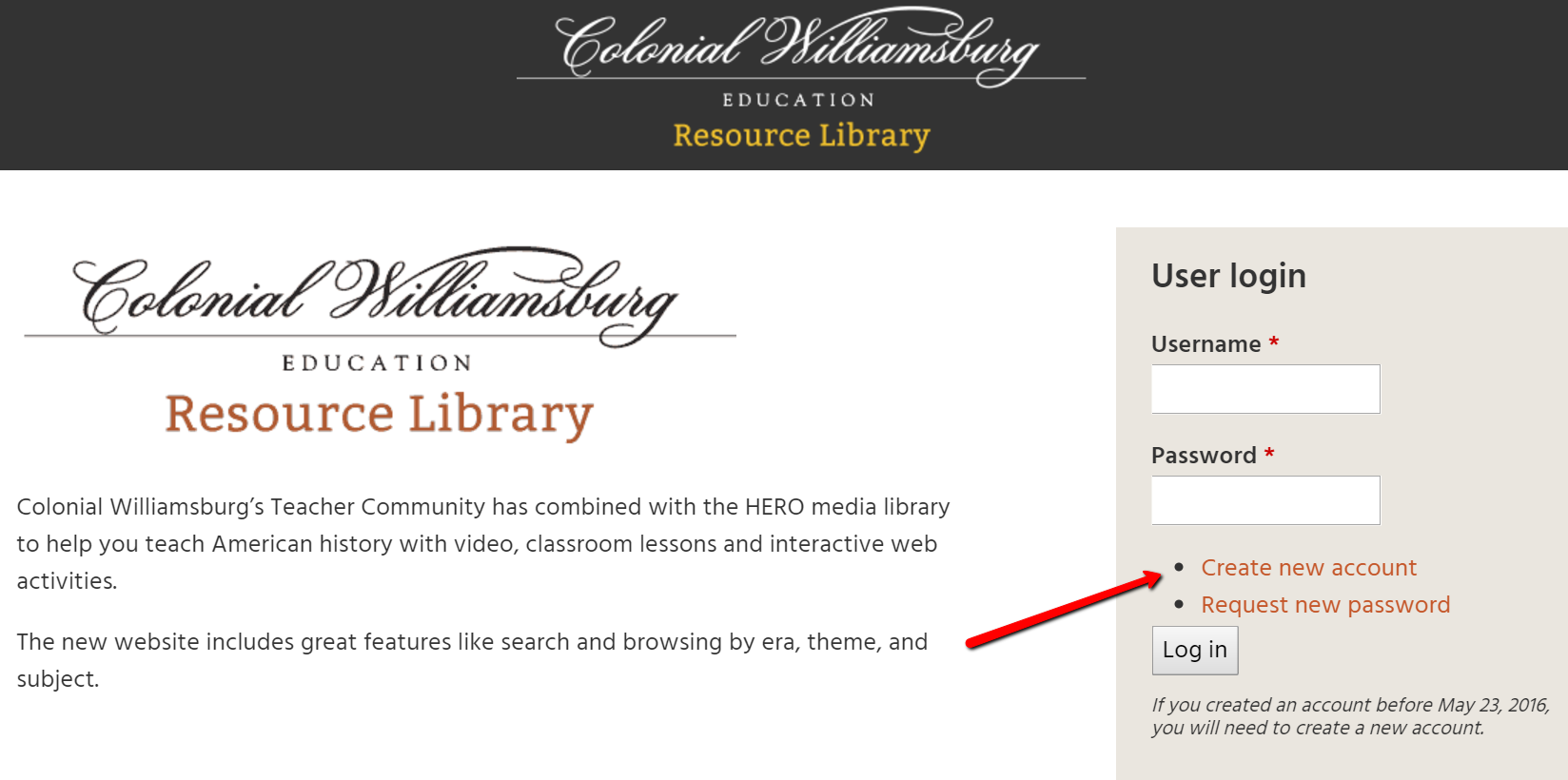
The Colonial Williamsburg Education Resource Library has been made available to everyone with a thirst for learning. What better resource to learn about your colonial American family research than with the library’s more than 100 lesson plans, background texts, and primary source media.
You will need to create an account, but it is free. Even though the account sign-up page seems to be for educators only, it is for everyone! I made my own account and got pretty excited looking through the many videos available. My son, a big history buff, is going to love this! I am always looking for ways to get the kids interested in family history.
United Kingdom – Military
Over 1.1 million War Office records covering officers, nurses, and other ranks have been updated in the British Army Casualty Lists 1939-1945 collection this past week. These lists cover the individuals reported as killed in action, wounded, prisoner of war, missing, died of wounds, dangerously ill, and more.
This collection at Findmypast is fully searchable and offers transcripts and digital images of the original documents. Most lists will give the person’s name, rank, service number, regiment, and status. It may also provide the date of death if applicable.
Denmark – Census
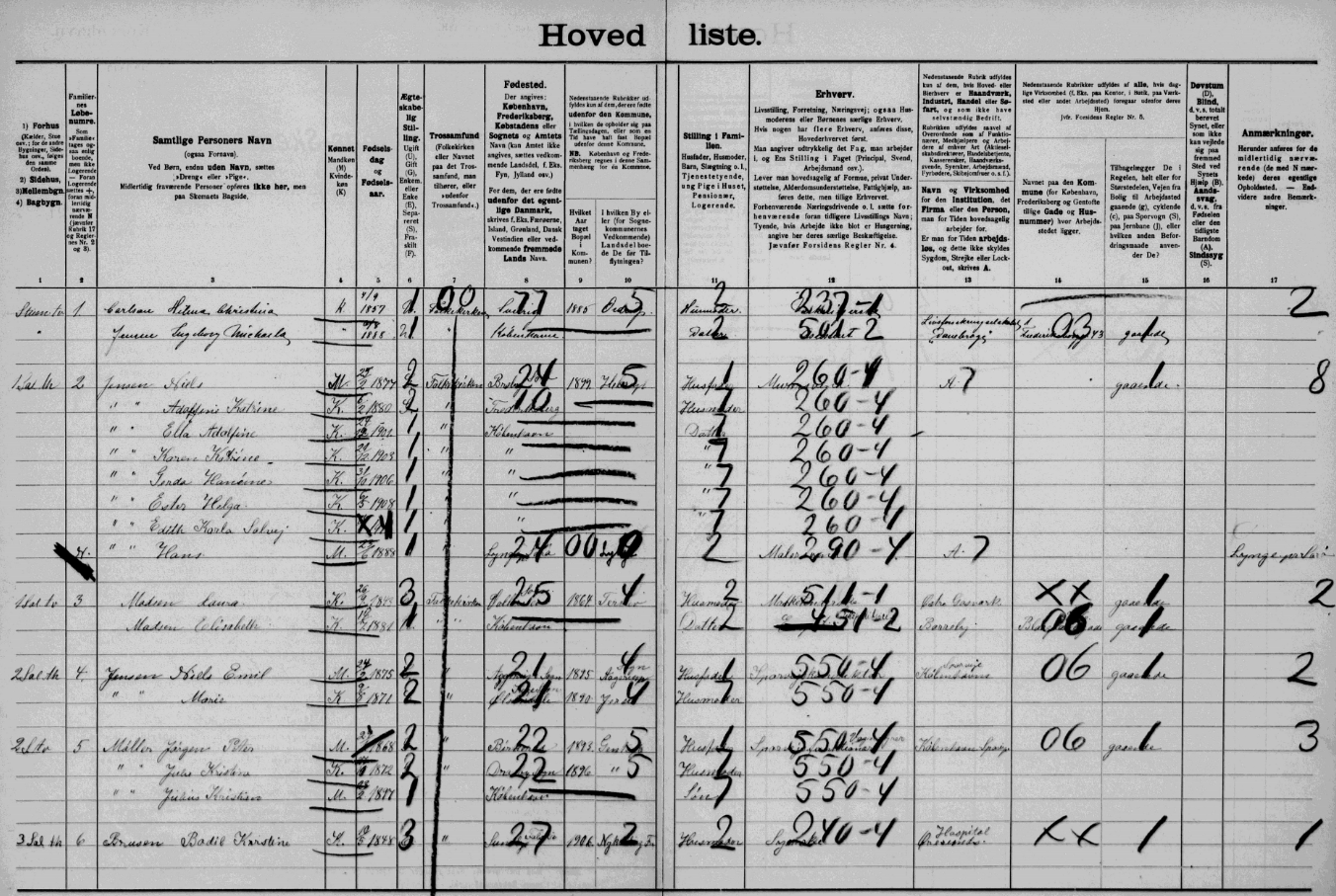
FamilySearch.org is where to look for your Danish ancestors! The name index of the Denmark census taken in 1911 is available for free at FamilySearch or with your paid subscription at MyHeritage.
The Denmark census of 1911 was the thirteenth census for the country. Though the census includes the countries of Greenland, Faroe Islands, and the Danish West Indies, what you will find on FamilySearch is only those enumerations for Denmark. The census is divided into three sections: Copenhagen city, other cities, and rural areas.
This census is written in Danish of course, so you might need a little help with some translation. Pop on over to FamilySearch wiki here to find a helpful chart of key words in both Danish and English.
This census asks questions pertaining to names of household members, birth date and year, birth location, religion, occupation, your means of getting to work, and how long it takes to get to your location of work! Isn’t that interesting?!
More Gems on Colonial American Family Research
Looking for even more tips and tricks to researching the colonial American family? Try these Genealogy Gem favorites!
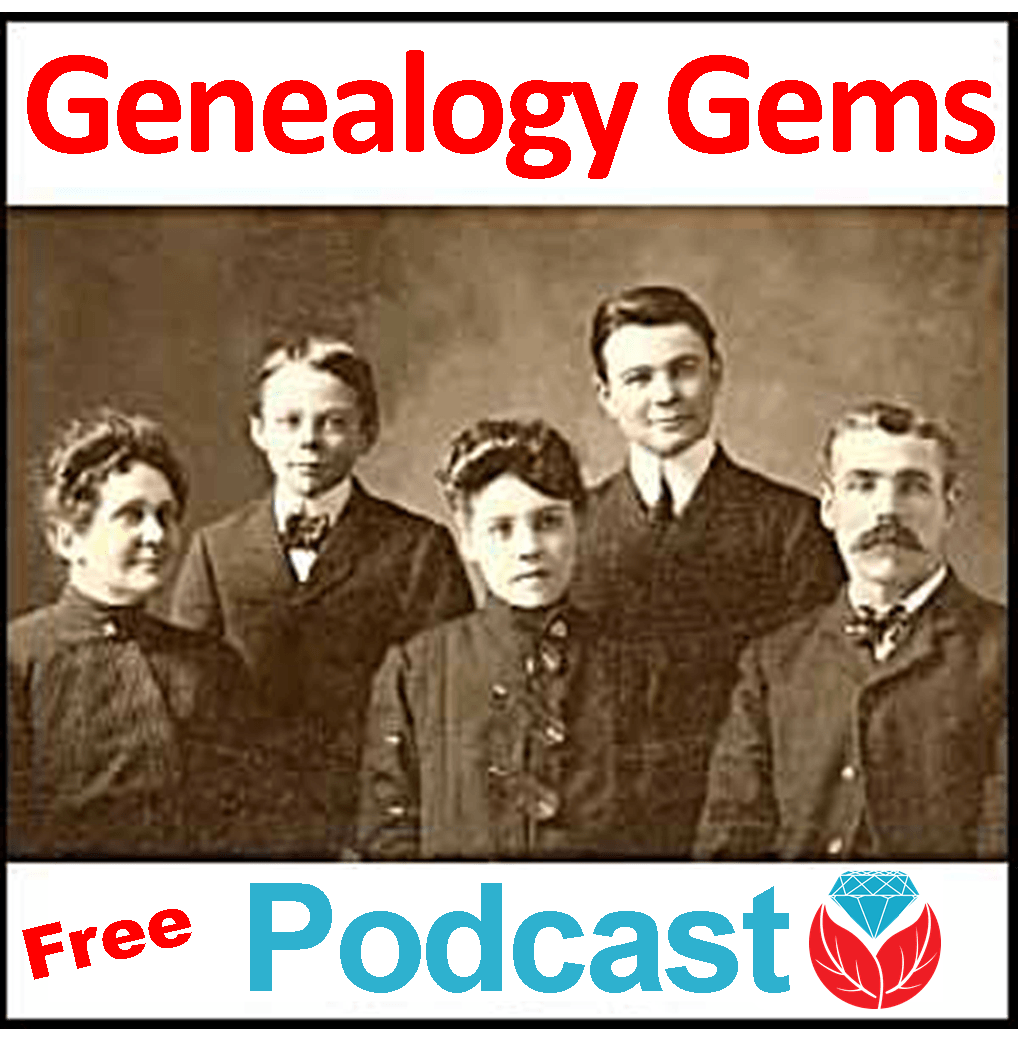 If you haven’t been enjoying The Genealogy Gems (free!) Podcast, try it out today! A podcast is like listening to a favorite radio show from your computer or mobile device. Get up-to-date with everything new and exciting in the world of genealogy, learn a new tech tip, and find inspiration in these wonderful podcast programs!
If you haven’t been enjoying The Genealogy Gems (free!) Podcast, try it out today! A podcast is like listening to a favorite radio show from your computer or mobile device. Get up-to-date with everything new and exciting in the world of genealogy, learn a new tech tip, and find inspiration in these wonderful podcast programs!
Disclosure: This article contains affiliate links and Genealogy Gems will be compensated if you make a purchase after clicking on these links (at no additional cost to you). Thank you for supporting Genealogy Gems!
by Lisa Cooke | May 20, 2016 | 01 What's New, Records & databases
 Here’s this week’s collection of new genealogy records online for New Spain, England, Ireland, the U.S. and the Kindgom of Hawaii.
Here’s this week’s collection of new genealogy records online for New Spain, England, Ireland, the U.S. and the Kindgom of Hawaii.
FEATURED COLLECTION: NEW SPAIN/NEW MEXICO. Ancestry.com has posted a new collection of land records for what is now New Mexico when it was part of Spain. These records span 1692-1846, come from the Twitchell compilation of materials from New Mexico’s Spanish Archives, and are only searchable by keyword and date. See the collection description for more details.
ENGLAND – BURIALS. Over half a million records have been added to Findmypast’s collection of Westminster burials. These include names, birthdates, , death and burial dates and where they were buried.
ENGLAND AND SCOTLAND. About 13.5 million new newspaper articles have been added to Findmypast’s British Newspapers collection. New titles cover Cheshire, Essex, Kent, Lancashire, Wiltshire, Yorkshire and Scotland.
ENGLAND – LONDON – MISC. A new online collection at Findmypast.com “details the lives of ordinary and common Londoners” from 1680-1817. The 1.5 million records include criminal registers, apprentice records, coroner inquests, workhouse minutes, clerks’ papers and more.
ENGLAND – SURREY. A new Ancestry.com collection of water rate books for Surrey, England is now available online. According to the collection description, “Rates were collected in each parish for support of the sick and poor, maintenance of roads and church, and other parish expenses.” You can expect to find names along with street names and dates.
GERMANY. Ancestry.com has posted two new databases of Lutheran baptisms, marriages and burials for Hesse, Germany. Over 2.5 million records are in one database for 1661-1875 and another 100,000 or so appear in an overlapping database for 1730-1875.
IRELAND. A collection of Dublin Metropolitan Police prisoner’s books are now online at the University College Dublin website. According to the collection abstract, “The Dublin Metropolitan Police (DMP) Prisoners Books for 1905-1908 and 1911-1918 are amongst the most valuable new documents to come to light on the revolutionary decade. They include important information on social and political life in the capital during the last years of the Union, from the period of widespread anticipation of Home Rule, to the advent of the 1913 Lockout, the outbreak of the First World War, the Easter Rising and its aftermath, including the conscription crisis of 1918. They will also be invaluable to those interested in criminology, genealogy, and family history.”
U.S. – CENSUS. Ancestry.com has updated its 1920 U.S. Census collection. The nature of the updates aren’t described. (About a year ago we mentioned FamilySearch’s re-indexing of parts of the 1910 census in this blog post.)
U.S. – HAWAII. Ancestry.com has posted a new collection of Hawaiian passport records for 1849-1950 and 1874-1900. These records were under the jurisdiction of the former Kingdom of Hawaii.
 Every week we post new genealogy records online! Are you getting our free weekly e-newsletter so you can stay up to date? When you subscribe you’ll receive a free e-book on Lisa Louise Cooke’s Google search strategies for genealogists. Enter your email address on this page.
Every week we post new genealogy records online! Are you getting our free weekly e-newsletter so you can stay up to date? When you subscribe you’ll receive a free e-book on Lisa Louise Cooke’s Google search strategies for genealogists. Enter your email address on this page.
by | Nov 20, 2015 | 01 What's New, African-American, British, Cemeteries, Digital Archives, FamilySearch, Findmypast, Immigration, Military, Records & databases, United States
 Every week, we post about exciting new genealogy records online. Scan this week’s list for anything you should search (or share with a friend): a colonial North American digital archive; Revolutionary War-era residents of Alabama; U.S. military burials; Freedmen’s Bureau records; California naturalizations and British WWI databases.
Every week, we post about exciting new genealogy records online. Scan this week’s list for anything you should search (or share with a friend): a colonial North American digital archive; Revolutionary War-era residents of Alabama; U.S. military burials; Freedmen’s Bureau records; California naturalizations and British WWI databases.
AFRICAN-AMERICAN RECORDS. Over 130,000 indexed images were added to the United States Freedmen’s Bureau Hospital and Medical Records 1865-1872 collection, searchable for free on FamilySearch. The index includes “patient registers, registers of sick and wounded, prescription books, and other medical records from freedmen hospitals and dispensaries….Records include letters and endorsements sent and received, account books, applications for rations, applications for relief, court records, labor contracts, registers of bounty claimants, registers of complaints, registers of contracts, registers of disbursements, registers of freedmen issued rations, registers of patients, reports, rosters of officers and employees, special and general orders and circulars received, special orders and circulars issued, records relating to claims, court trials, property restoration, and homesteads.”
ALABAMA REVOLUTIONARY WAR. A new database of indexed images at Ancestry “contains biographies, news clippings, and cards in paragraph form detailing persons who were residents in Alabama during the Revolutionary War in America.”
BRITISH WWI RECORDS. Findmypast has released new databases relating to World War I service: Surrey, Military Tribunals, 1915-1918 (military exemptions for the county of Surrey); and two British Army memorial rolls for employees of Lloyds of London and the London Stock Exchange who died in service.
CALIFORNIA NATURALIZATIONS. A database with indexed images of over a century’s worth of California naturalization records (1887-1991) has been updated at Ancestry.com.
COLONIAL NORTH AMERICA. A new digital archive has been launched: The Colonial North American Project at Harvard University. Its goal is to post digitized versions of “all known archival and manuscript materials in the Harvard Library that relate to 17th and 18th century North America.” According to the site, its “documents reveal a great deal about topics such as social life, education, trade, finance, politics, revolution, war, women, Native American life, slavery, science, medicine, and religion. In addition to reflecting the origins of the United States, the digitized materials also document aspects of life and work in Great Britain, France, Canada, the Caribbean, and Mexico.” (Click here to read our blog post about the project’s announcement in 2013.)
U.S. MILITARY BURIALS. BillionGraves.com recently added over 8 million U.S. military veterans’ burial records to the Special Collections that can be accessed by BG+ subscribers. These records include burial and cemetery records from the Veterans Affairs office, as well as military headstones from civilian headstones around the world.
 Thanks for sharing these new genealogy records online with friends and fellow genealogists and through your genealogical society social media channels. It’s fun to spread good news!
Thanks for sharing these new genealogy records online with friends and fellow genealogists and through your genealogical society social media channels. It’s fun to spread good news!
by Lisa Cooke | Dec 6, 2013 | 01 What's New, British, Canadian, Records & databases
If you’ve got British colonial roots in North America, you know how tough it can be to learn more about your family during that time. That’s why I was excited to read a
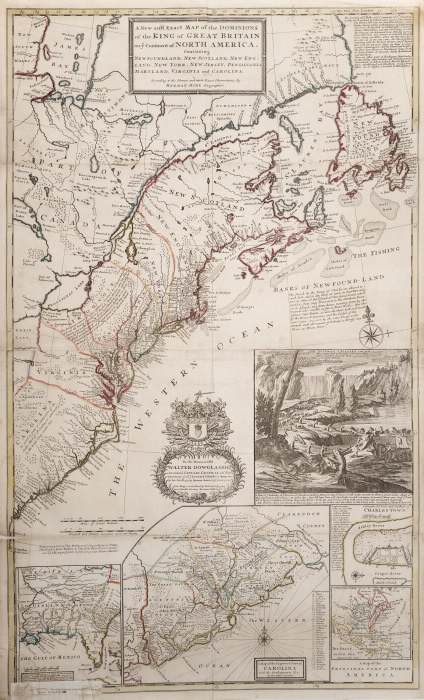
The Beaver Map, 1715. By Special Collections Toronto Public Library. Flickr, via Wikimedia Commons.
recent article in the Harvard Gazette.
According to the article, plans are afoot to digitize and make available millions of British colonial documents. Yep, you read that right. Millions. There are still that many colonial-era documents sitting largely untouched in public and private archives, far from the reach of the everyday genealogist.
The Gazette reports not one but two major digitizing projects underway relating to British colonial documents in the U.S. Harvard University is leading the first project, which is already funded and underway. It will capture around 30 million pages of 17th- and 18th-century material from more than 1600 manuscript collections at 12 different Harvard repositories.
As if that’s not good enough news, a much larger project is in the works, too. A larger-scale Colonial Archives of North America has plans to digitally assemble pre-Revolutionary War material from Harvard and several historical societies, archives and Libraries in New England, New York and beyond (including Montreal). I was pleased to see that records relating to businesses, poverty, public health and indigent care will form part of the anticipated collection. These kinds of documents talk about everyday folks and their living conditions. Just what we want for our colonial genealogy. This second project is not funded yet but researchers are confident it will be.
Meanwhile, check out online resources like these for colonial documents:
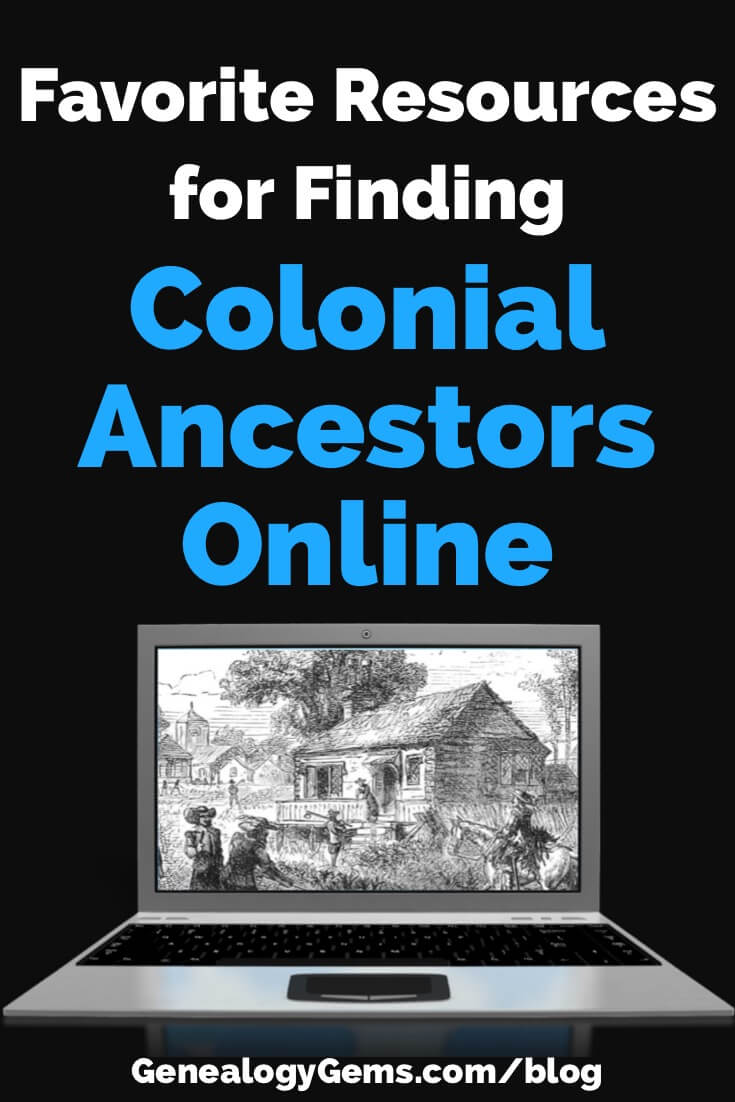



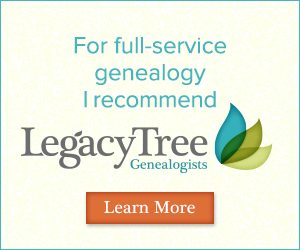



 If you haven’t been enjoying
If you haven’t been enjoying  Here’s this week’s collection of new genealogy records online for New Spain, England, Ireland, the U.S. and the Kindgom of Hawaii.
Here’s this week’s collection of new genealogy records online for New Spain, England, Ireland, the U.S. and the Kindgom of Hawaii. Every week we post new genealogy records online! Are you getting our free weekly e-newsletter so you can stay up to date? When you subscribe you’ll receive a free e-book on Lisa Louise Cooke’s Google search strategies for genealogists. Enter your email address on this page.
Every week we post new genealogy records online! Are you getting our free weekly e-newsletter so you can stay up to date? When you subscribe you’ll receive a free e-book on Lisa Louise Cooke’s Google search strategies for genealogists. Enter your email address on this page.




